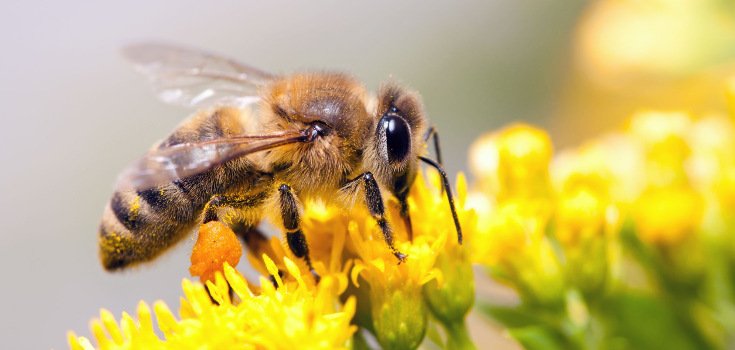Portland Bans Insecticide in Light of Massive Bee Deaths

Portland, Oregon has joined at least seven other cities in banning the usage of neonicotinoids, a class of insecticides that many scientists think is behind colony collapse disorder and the premature death and dysfunction of many bees and other pollinating insects. The ban applies to all city lands and will be enforced despite the opposition of some nearby farmers who claim neonicotinoids are critical for producing their food crops.
The ever-expanding number of members of the neonicotinoid family are all relative newcomers in the insecticide world. The first commercial neonicotinoid, imidacloprid, appeared in 1985 and is still in use today.
Neonicotinoids are highly neurotoxic, sharing a common mode of action that affects the central nervous system of insects, resulting in their paralysis and death. Pollinating insects are essential for the growth of numerous crops, including apples, plums, broccoli, peppers, cabbage, Brazil nuts, and cashews.
In 2008, neonicotinoids were scrutinized for their environmental impact in Germany, where they were linked with several adverse ecological effects. In 2013, the EU and some other European countries banned use of certain members of the neonicotinoid family.
Meanwhile, the USDA took a broad look into the decline of bee colonies in the country. Their report highlighted the fact that in 1990, there were 3 million bee colonies. By 2013, that number had dropped to 2.5 million, demonstrating that the collapse is a long-term issue. Though their report was dire for insects and people, it did not offer any immediate solutions. Soon after it was released, the EPA approved a fourth generation neonicotinoid, known as sulfoxaflor, an action that left many followers of the situation dumbfounded.
In 2014, tens of millions of bees were found dead in Ontario Canada, just days after a planting of genetically modified corn. Ontario’s The Post reported that the crops were sprayed with neonicotinoids produced by Bayer CropScience. The air seeding of neonicotinoid-treated GM corn was seen as and accelerating factor in the bee losses. It is likely that in most parts of North America the reason neonicotinoids continue to be permitted is heavy influence from the chemical industry.
Because the federal government has refused to do anything about the havoc being caused by neonicotinoids, dealing with it has become the province of the states and municipalities. In 2013, Eugene Oregon was the first city to ban its use. Since then, efforts have centered around the Pacific Northwest, with Seattle and Spokane in Washington joining in.
One recent example can be seen with Amanda Fritz, Commissioner of Portland, who was successful in gaining approval of the measure to ban neonicotinoids on city lands such as gardens and municipal parks by presenting it as a public health issue requiring emergency action.
“I think we’re doing another good thing for the city of Portland, Oregon…and maybe the entire world,” she said.
Her opponents, who included Oregonians for Food and Shelter, a coalition of farmers, and other pesticide users, were of the view that other research had refuted the notion that bees have been harmed and killed by neonicotinoids.

“In 2014, tens of millions of bees were found dead in Ontario Canada, just days after a planting of genetically modified corn”. My question is how does a planting of corn seed into the ground days before kill millions of bees? Is it normal behavior for millions of bees to burrow into the ground to eat corn seed?
Maybe they planted corns that were already growing. You know, the same way you plant flowers after buying them from home depot.
Maybe they purchased a few thousand batch of GMO corns from Monsanto’s lab and planted them in the farm.
Did you read the second sentence?
“Ontario’s The Post reported that the crops were sprayed with neonicotinoids produced by Bayer CropScience.”
Got it?
Not all of it was engineered to produce its own toxins. Much of it was produced to survive the use of roundup. Perhaps they sprayed heavily with roundup when planting, and the bees were exposed when they came into contact with the existing vegetation that was sprayed.
do it NOW!!!!!
However, as Snopes* was quick to point out, the GMO crops themselves remain ‘unproven’ to be the cause of colony collapse. What is more likely, according to the site, is that “the neonicotinoid pesticides are coating corn seeds, and with the use of new air seeders, are blowing pesticide dust into the air when planted.” Either way, it is due to unsustainable farming methods that bees are dying in rapid numbers.